Israel at war: What happened on days 21-22?
1,400 Israelis murdered since October 7 massacre, including 311 soldiers • Four out of 230 known hostages released by Hamas
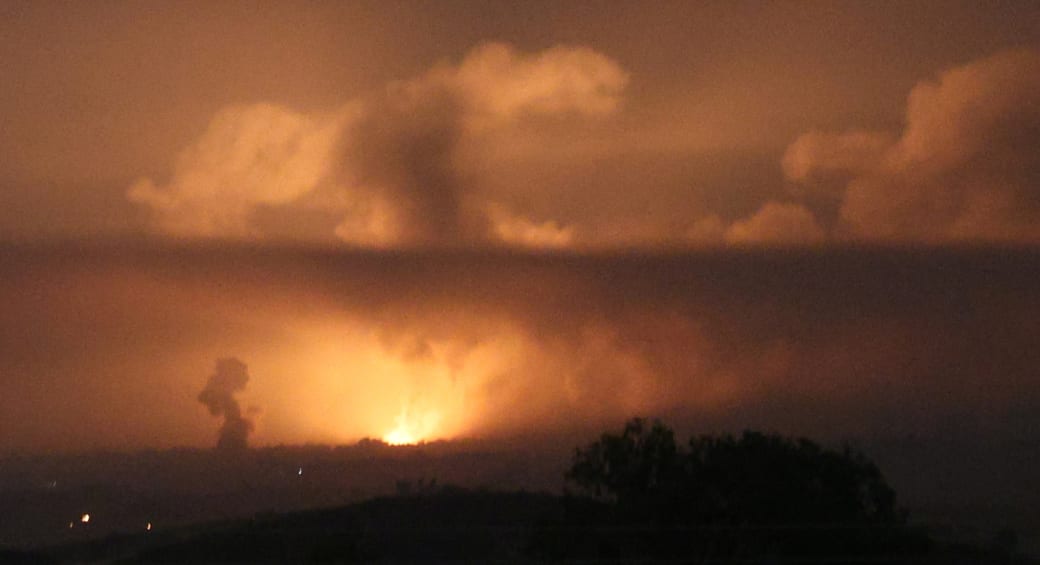

If Israel can't defeat Hamas, our partners will be next - Netanyahu
IDF launches ground invasion to crush Hamas in Gaza.
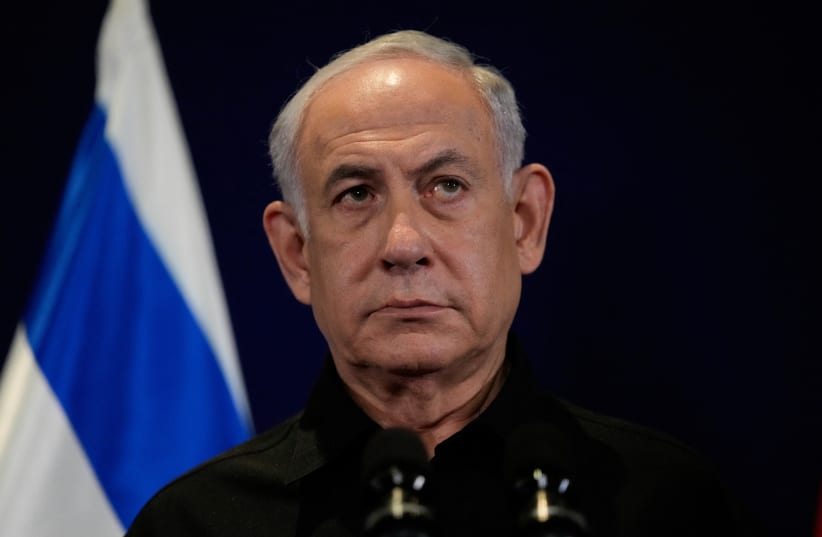
The Israel Defense Forces have entered the Gaza Strip and are operating on the ground with support from troops in the air and at sea, Israel's political and military leadership said Saturday night.
"Last night, additional ground forces entered Gaza, marking the beginning of the second stage of the war, whose goal is to destroy the military and political capabilities of Hamas and to bring our kidnapped citizens back," Prime Minister Benjamin Netanyahu said in an evening briefing.
"We are only at the beginning of the road. The war will be tough and long," the prime minister said. But he stressed, "We are prepared for it. This is our second War of Independence. This is our mission, our purpose in life, and together we will prevail."
Netanyahu said that not only do "the people and the leadership stand behind our soldiers," but also the international community is rooting for Israel.
"Our partners understand that if Israel doesn't win, they will be next," he said. "Many around the world understand well that Israel is not only fighting its war but a war for all of humanity, a war of humanity against barbarism."
Go to the full article >>When this is over, Gaza will be very different - Israeli PM adviser
Israel is beefing up the pressure on Palestinian terrorist group Hamas, its military operations are underway and Gaza will be very different, Mark Regev, an adviser to Israel's Prime Minister Benjamin Netanyahu, said on Friday.
"We are beefing up the pressure on Hamas. We're increasing the pressure that they're under. Our military operations are underway," he told Fox News.
"They will continue to be on the receiving end of our military blows until we have dismantled their military machine and dissolve their political structure in Gaza. When this is over, Gaza will be very different," he said.
Go to the full article >>Arsonist and firefighter: Understanding Qatar’s role in the region
Qatar’s long-standing strategy of alignment with Islamist and jihadi politics in the region does not derive from Islamist beliefs on the part of the ruling family.
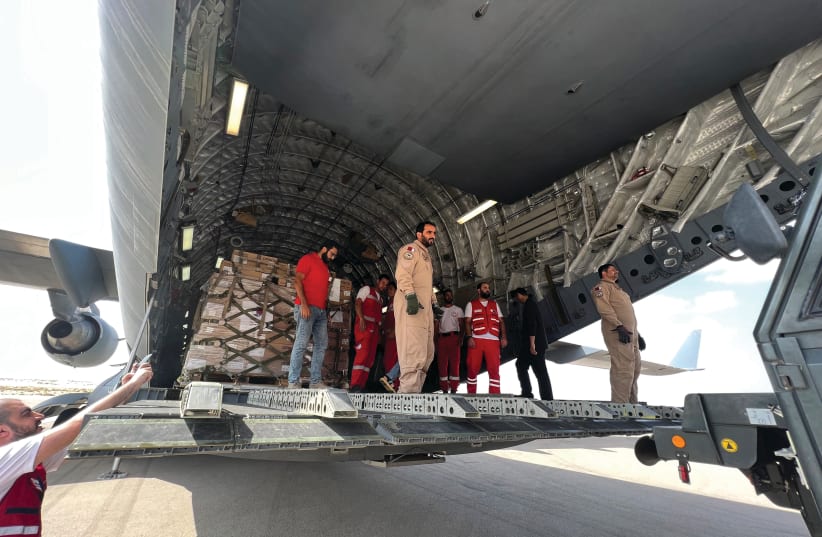
The war between Israel and Hamas launched by the Hamas massacre of October 7 appears currently to be in a kind of holding pattern. Israel has assembled a large force on the Gaza border and announced its intention to carry out a ground operation to collapse the Hamas governing authority in the Strip. Emerging evidence suggests differences at the top level between the prime minister and the defense minister regarding the feasibility of this goal, and differences also between Israel and the United States. It appears that both the US administration and the Israeli prime minister are not in favor of an immediate major ground maneuver. Instead, the current focus appears to be on the hostages taken by Hamas on October 7, and efforts to secure their release.
The tiny, gas-rich emirate of Qatar is, according to a number of reports, playing a key role in these efforts. Israel’s National Security Adviser Tzachi Hanegbi on Wednesday tweeted that he is “pleased to say that Qatar is becoming an essential party and stakeholder in the facilitation of humanitarian solutions. Qatar’s diplomatic efforts are crucial at this time.”
It is hence appropriate to take a look at the complex, outsize, and contradictory role played in regional diplomacy by this tiny Gulf emirate in order to better understand why it seems regularly to appear whenever contacts between Western and pro-Western powers, and Islamist and jihadi groups come on the agenda.
Qatar is considered by the United States to be a “major non-NATO ally.” The US maintains its main air base in the Mideast at al-Udeid, located within the emirate. Yet Doha has over the last quarter century pursued a regional strategy of alliance with the movements of political Islam, on both the propaganda and practical levels. As a result of this strategy, Doha possesses lines of communication to, and relations of trust with, a variety of Islamist organizations across the region.
Qatar’s long-standing strategy of alignment with Islamist and jihadi politics in the region does not derive from Islamist beliefs on the part of the ruling family. In this, it differs from, say, Turkey or Iran, which are controlled by Islamist ruling authorities who fairly straightforwardly back people with similar beliefs to their own (Turkish support for Hamas and for Syrian Sunni jihadi groups, Iranian support for Hezbollah, Hamas, Islamic Jihad).
Go to the full article >>Jordan: Israel's ground war on Gaza will be 'humanitarian catastrophe'
Jordan's Foreign Minister Ayman Safadi said on Friday the outcome of Israel launching a ground war on the Gaza Strip will be "a humanitarian catastrophe of epic proportions."
"Voting against Arab UNGA resolution means approving this senseless war, this senseless killing," Safadi added in a post on messaging platform X.
Go to the full article >>IDF ground troops intensifying efforts to destroy Hamas in Gaza
“In the last few hours, we have severely increased our attacks in Gaza,” he said during an evening briefing, noting that attacks were taking place from the air, sea and land.
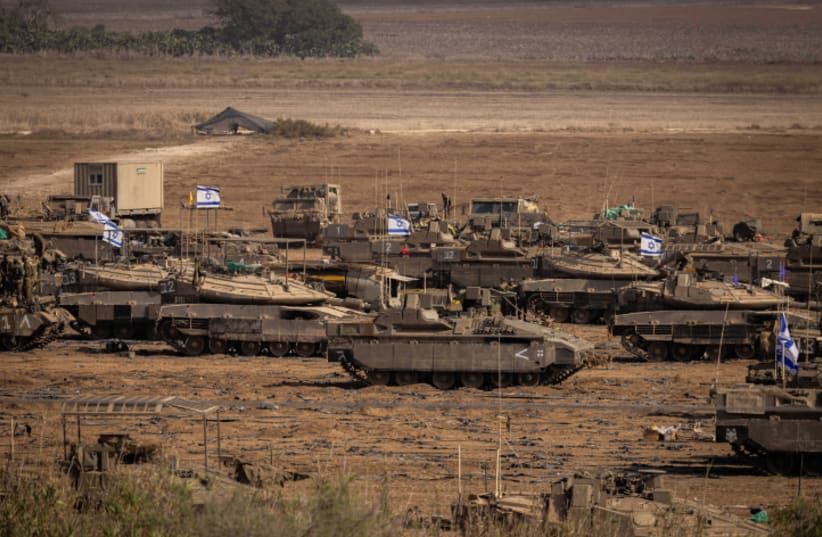
IDF ground troops are expanding their efforts inside Gaza to dismantle the Hamas terrorist infrastructure, IDF Spokesman Daniel Hagari said Friday evening.
Palestinian media reported that Israeli tanks assumed positions within the Gaza Strip late on Friday.
Go to the full article >>US supports pause in Gaza for humanitarian aid, fuel - White House
The United States supports a pause in Israeli military operations in Gaza to get humanitarian aid, fuel and electricity to civilians there, White House spokesman John Kirby said on Friday.
Kirby also said that if getting hostages out of Gaza requires a localized temporary pause, then the United States is in support of that.
Go to the full article >>Post-trauma response: The growing trend of wanting to return to Gaza
There have been many initiatives in the past 19 years to reestablish Jewish communities in the Gaza Strip, but until the October 7 massacre by Hamas, it didn't look likely.
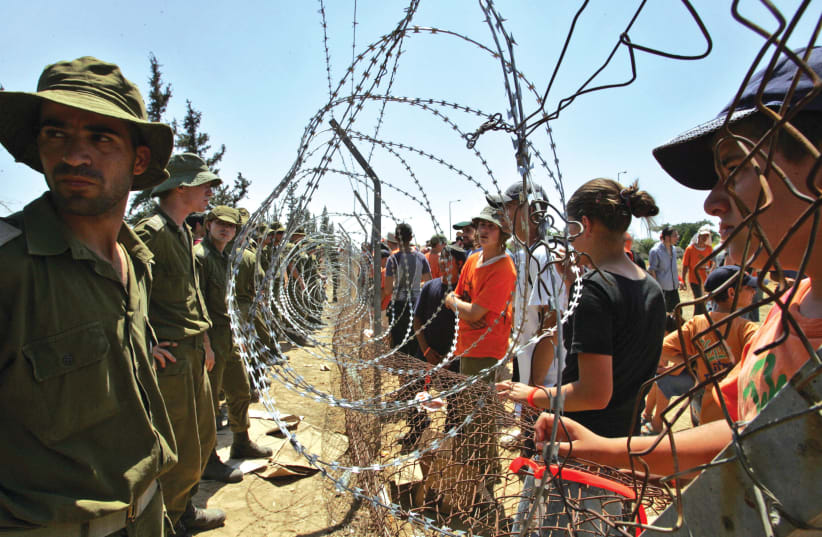
Hanan Ben Ari, one of Israel’s leading singers, sang one of his first hit songs this week and symbolized a deep but growing trend. The song, “Ima Im Hayiti,” (Mother, If Only I Could), was written after the Disengagement from the Gaza Strip in 2005, when the Gush Katif settlements there were dismantled.
Ben Ari, who grew up in Samaria as a member of a prominent religious-Zionist family, is considered to be in the mainstream of the Israeli pop scene. He stars in commercials for El Al and other large companies. He was criticized by some for hinting, in a performance a few days ago, that Israel should reconquer Gaza – he repeated one of the more powerful sentences in the aforementioned song, “You promised that someday we’ll come back here,” meaning, to Gush Katif.
There have been many initiatives in the past 19 years to reestablish Jewish communities in the Gaza Strip, but until the October 7 massacre by Hamas, most of those activists involved weren’t sure it would actually happen.
Missing Gush Katif
In the ever-changing landscape of the Middle East, few voices remain as deeply affected by, and intricately connected to, the past as that of Meir Dana-Picard, a former resident of Gush Katif. Once a young manager at the Chasalat, a vegetable packing house in the region, today Dana-Picard embodies the memories, aspirations, and uncertainties of those who once called Gush Katif home.
Go to the full article >>Gaza hostages take center stage in NYC with empty Shabbat table
The installation was an attempt to raise awareness among the US population to the efforts to secure the release of the hostages and hopes to increase global pressure on Hamas and their supporters.

The Israeli-American Council (IAC) erected a monument on Friday afternoon in Times Square, New York featuring a table laid out in traditional Shabbat meal style with 224 empty seats, one for every hostage being held by Hamas in Gaza, the organization said in a press release.
The installation was an attempt to raise awareness among the US population of the efforts to secure the release of the hostages and hopes to increase global pressure on Hamas and their supporters.
This followed a separate rally that was held by the IAC a week prior which was attended by thousands of pro-Israel supporters who protested in front of 15 large billboards featuring faces of the hostages.
The monument has since been viewed by thousands of people.
299 individuals are still being held hostage inside Gaza according to the latest data reported by The Jerusalem Post.
Go to the full article >>Israel condemns Houthi missile that hit Egyptian Read Sea town
Al Qahera reported the blast was related to ongoing fighting between Israel and Hamas terrorists.
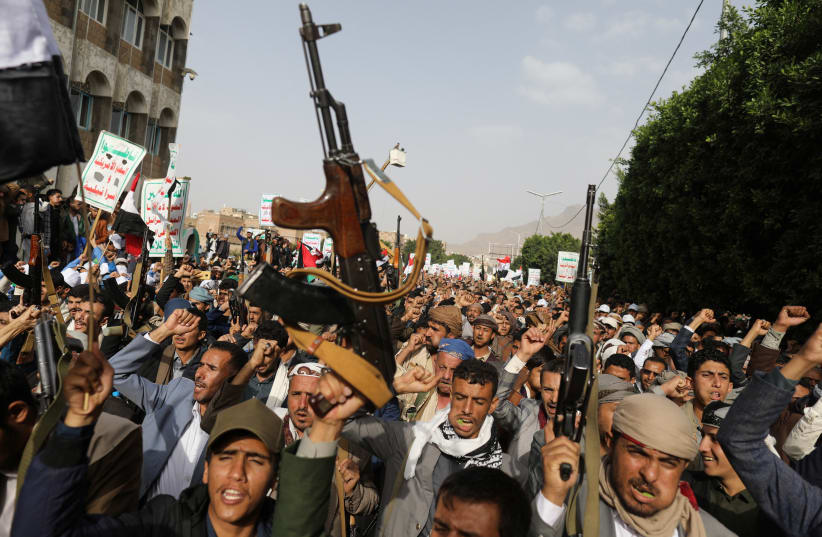
Israel on Friday evening condemned a Houthi missile launch aimed at Israel that struck an Egyptian resort town about 220 km (135 miles) from the Gaza Strip early on Friday.
The missile hit a medical facility in Taba, injuring at least six people, Al Qahera TV reported. A witness in Taba confirmed hearing an explosion and seeing smoke rising, but Reuters was not immediately able to identify the blast's source.
A large missile just hit a residential area in Taba, Egypt, which is just outside Southern Israel.
— 🇺🇸ProudArmyBrat (@leslibless) October 27, 2023
It may have been sent by the Houthi terrorists in Yemen - OR, maybe Hamas misfired again. Oooops!
Egypt will be pissed! pic.twitter.com/T1kLNn8Rxk
مصادر مطلعة: سقوط صـ ـاروخ في #طابا وإصـ ـابة ٥ أشخاص وحدوث تلفيات في إحدى العمارات السكنية#القاهرة_الإخبارية pic.twitter.com/5W0THc9wNx
— AlQahera News (@Alqaheranewstv) October 27, 2023
Taba straddles Egypt's border with Israel's Red Sea port of Eilat. Israel's military said it was aware of a security incident outside its borders.
Go to the full article >>US warns Israel on extremist settler violence, ‘like gasoline on fire'
According to the United Nations Office of the Commissioner for Humanitarian Affairs, there have been 146 settler attacks against Palestinians.
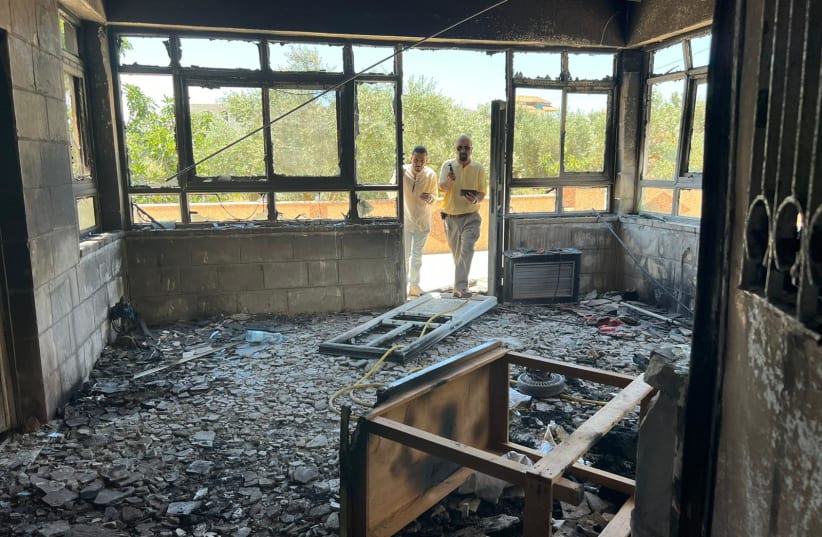
The United States twice publicly warned Israel this week to put a halt to extremist settler violence against Palestinians.
“We must not go back to the status quo where extremist settlers can attack and terrorize Palestinians in the West Bank,” the US Ambassador to the United Nations Linda Thomas-Greenfield said on Friday in a public address she delivered to the plenum on the Gaza war.
On Wednesday US President Joe Biden also spoke out on the issue.
“I continue to be alarmed about extremist settlers attacking Palestinians in the West Bank that — pouring gasoline on fire is what it’s like,” he said during a joint press conference with the Australian Prime Minister in Washington.
“They’re attacking Palestinians in places that they’re entitled to be, and it has to stop. They have to be held accountable. And it has to stop now,” he said.
Go to the full article >>ISRAEL, HAMAS AT WAR: WHAT YOU NEED TO KNOW
- Hamas launched a barrage of rockets on October 7, with thousands of terrorists infiltrating from the Gaza border
- Over 1,400 Israelis and foreign nationals were murdered as of Tuesday afternoon, and more than 5,431 were wounded according to the Health Ministry
- Israel reportedly preparing for a ground invasion of the Gaza Strip
- IDF: 229 families of Israeli captives in Gaza have been contacted, 30 of them children